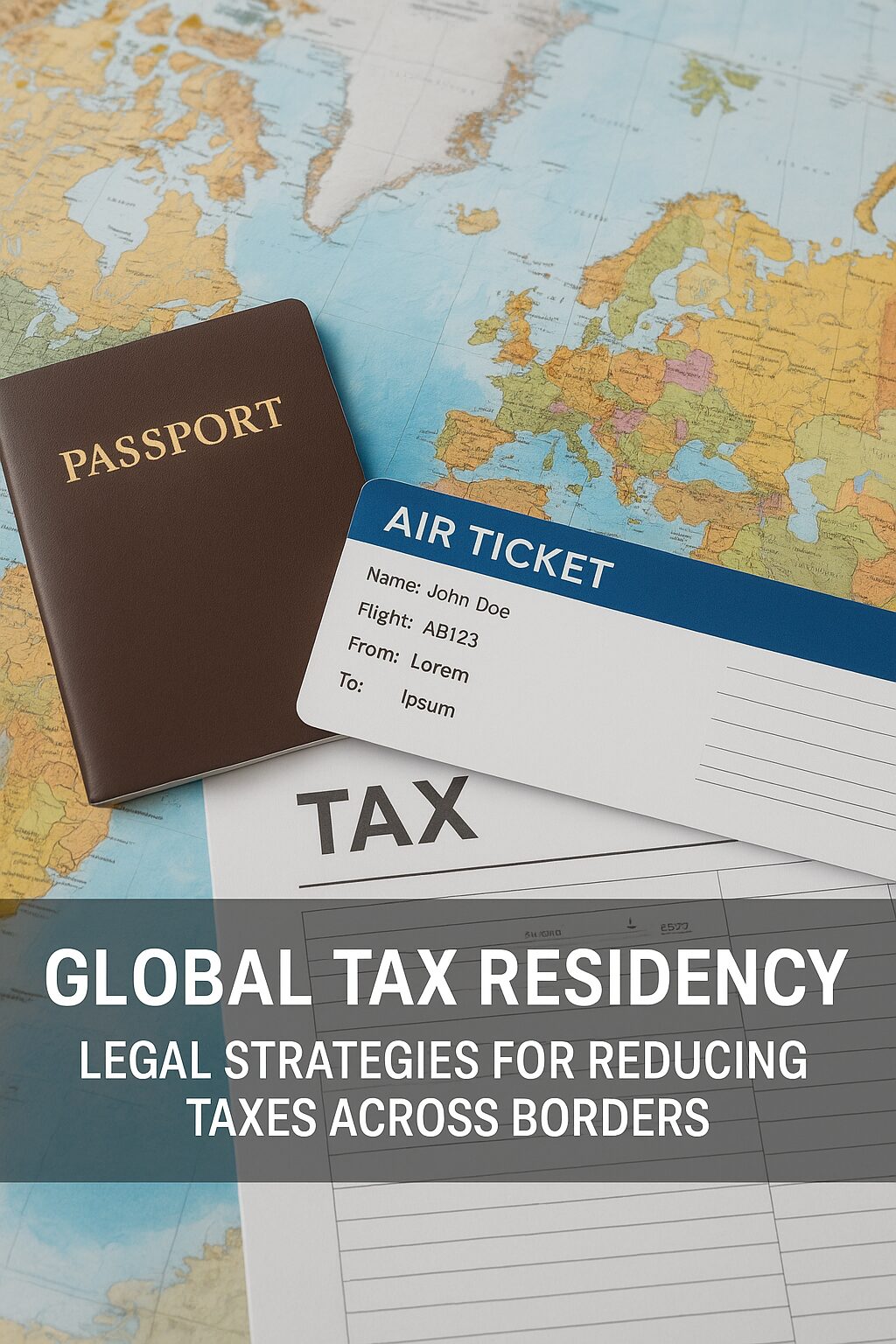Taxes are one of the largest expenses individuals face, and for high-net-worth individuals and global professionals, they can also be one of the most complex. While tax avoidance through illegal methods is never an option, tax optimization using legal residency strategies is a practical and powerful tool to minimize liabilities.
As more people live international lifestyles—whether as digital nomads, expatriates, or investors—understanding global tax residency has become essential. This guide explains how to legally structure your life across borders to reduce tax burdens, preserve wealth, and maintain compliance.
1. What Is Tax Residency?
Tax residency is the legal status that determines where you are obligated to pay taxes. Unlike citizenship, which is fixed, tax residency can change based on where you live, work, or invest.
Each country applies different criteria, such as:
- Days Spent in Country: Many jurisdictions consider you a tax resident if you spend more than 183 days per year there.
- Center of Vital Interests: Where your family, property, or business is located.
- Permanent Home: Owning or renting a primary residence.
- Economic Ties: Where your income is earned, investments are made, or assets are held.
2. Why Optimize Tax Residency?
- Lower Income Tax Rates: Some countries impose little or no income tax.
- Capital Gains Advantages: Certain jurisdictions exempt foreign-source income from capital gains tax.
- Inheritance and Estate Tax Relief: Proper residency planning reduces or eliminates estate tax exposure.
- Business Efficiency: Entrepreneurs can structure operations in tax-friendly environments.
- Financial Freedom: By reducing liabilities, more capital is available for investment and lifestyle.
3. Popular Low-Tax and No-Tax Jurisdictions
- United Arab Emirates: No personal income tax, strong infrastructure, and international access.
- Monaco: Famous for zero personal income tax; attractive to high-net-worth individuals.
- Singapore: Moderate taxes, business-friendly environment, and tax treaties.
- Portugal (NHR Regime): Non-habitual resident program offers reduced rates for foreign income.
- Malta: Remittance-based taxation system favorable for foreign residents.
Example: An entrepreneur relocates from a high-tax country with 45% marginal tax rates to the UAE. With proper planning, they legally reduce their effective tax rate to near zero, while reinvesting saved capital into business expansion.
4. Double Taxation Agreements (DTAs)
DTAs are treaties between countries that prevent individuals from being taxed twice on the same income. These agreements are essential for anyone with income from multiple jurisdictions.
Benefits of DTAs:
- Reduced withholding tax on dividends, interest, and royalties
- Clarification on which country has taxing rights
- Elimination of double taxation through credits or exemptions
5. Residency vs. Citizenship
It is crucial to distinguish:
- Residency: Determines where you pay taxes.
- Citizenship: Determines nationality, rights, and obligations.
You can legally be a citizen of one country but a tax resident of another, depending on your lifestyle and planning.
6. Practical Strategies for Tax Residency Optimization
1) Relocation
Move to countries with favorable regimes. Ensure compliance by severing sufficient ties with the old jurisdiction.
2) Split-Year Residency Planning
If you move mid-year, plan carefully to avoid being taxed as a resident in two places simultaneously.
3) Using Tax Treaties
Leverage DTAs to avoid double taxation and minimize withholding taxes.
4) Offshore Structures
Set up holding companies or trusts in jurisdictions that maximize tax efficiency while staying compliant.
5) Family Considerations
Plan for spouse and children’s residency to avoid conflicts under “center of vital interests” rules.
7. Risks and Compliance Issues
- Exit Taxes: Some countries impose taxes when you give up residency.
- Substance Requirements: Authorities may challenge residency if they believe ties remain in the old country.
- Blacklisted Jurisdictions: Relocating to jurisdictions with poor reputations may trigger audits or penalties.
- Changing Laws: Tax regimes evolve; strategies must adapt to remain effective.
8. Case Studies
Case 1 – Digital Nomad
A software consultant relocates to Portugal under the NHR regime. They continue serving clients globally while paying reduced taxes on foreign income.
Case 2 – Entrepreneur
A business owner establishes a holding company in Singapore, minimizing taxes on dividends and reinvesting capital globally.
Case 3 – Retiree
A retiree moves to Malta, where foreign pension income is taxed only when remitted locally, reducing effective liabilities.
9. Building a Long-Term Tax Residency Strategy
- Review annually: Tax residency rules can change.
- Work with professionals: International tax advisors and lawyers ensure compliance.
- Plan succession: Estate planning is critical when relocating assets across borders.
- Diversify residencies: Some individuals maintain multiple residencies for flexibility.
Conclusion
Global tax residency strategies are not about avoiding responsibilities—they are about aligning your lifestyle and investments with jurisdictions that reward mobility and planning. By legally optimizing your tax residency, you gain financial freedom, preserve wealth, and create opportunities for international growth.
